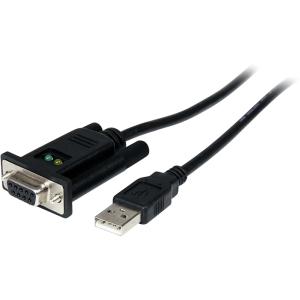Description
The USB to Serial Adapter - Null Modem with FTDI USB UART Chip provides a reliable solution for connecting legacy serial devices to modern computers via a USB port. This high-quality adapter is equipped with an FTDI USB UART chip, ensuring compatibility and stability for your RS232 serial communication needs. Ideal for use in industrial, commercial, or home environments where serial connections are essential.
Features:
- FTDI USB UART Chip: Utilizes the FTDI FT232R chip for reliable and stable USB to RS232 conversion. The FTDI chip is known for its excellent performance and wide compatibility.
- Null Modem Configuration: Designed with a null modem configuration, allowing direct serial communication between two devices without a traditional modem or null modem cable.
- DB9 (9-Pin) Connector: Features a standard DB9 (9-pin) connector for easy connection to serial devices, such as printers, modems, and other peripherals.
- Plug and Play: Easy to install with plug-and-play functionality. No additional drivers are needed for most operating systems, simplifying the setup process.
- Broad Compatibility: Supports a range of operating systems including Windows, macOS, and Linux. Ensures compatibility with various serial communication applications and devices.
- Compact and Durable: Designed with a compact form factor for easy portability and durability for long-term use.
Specifications:
- Chipset: FTDI FT232R
- Connector Type: DB9 (9-pin) Serial
- Configuration: Null Modem
- Interface: USB 2.0
- Compatibility: Windows, macOS, Linux
- Cable Length: 6 feet (1.8 meters)
- Data Transfer Rate: Up to 1 Mbps
- Dimensions: 3.5 x 1.2 x 0.8 inches (89 x 30 x 20 mm)
- Weight: 0.2 lbs (0.09 kg)
- Color: Black
Applications:
- Legacy Device Connectivity: Connect older serial devices to modern computers for data transfer, configuration, or control.
- Industrial and Commercial Use: Ideal for use in industrial settings where serial communication is still prevalent, such as with machinery or control systems.
- Networking and Data Acquisition: Useful for serial port communication in networking equipment, data acquisition systems, or other technical applications.




